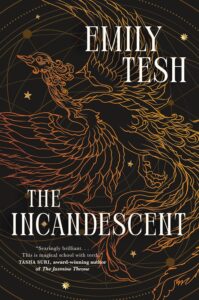
This review is based on an eARC (Advance Reading Copy) provided by the publisher via NetGalley in exchange for an honest review. The Incandescent will be released on May 13, 2025.
I’ve picked up Emily Tesh twice before in my attempts to cover as much Hugo-nominated fiction as possible since becoming a voter in 2021. In both cases, I had some fairly substantial critiques, but I enjoyed the prose and characterization enough to come away with overall positive impressions. And so I jumped at the chance to pick up an advance copy of her newest magical school novel, The Incandescent.
The Incandescent takes place at an elite English boarding school and is written from the perspective of a powerful demon summoner who has returned to her old school to serve as Director of Magic. But with teenage students with the power to summon demons, enough ambient magical energy to attract some of the most powerful, and a combination of age and budgetary restrictions making for particularly kludgy defenses, there’s bound to be a whole lot of danger accompanying the inevitable drudgery of paperwork.
Readers of the same age as the protagonist have grown up on magical boarding school novels, and while The Incandescent shifts the perspective to the teacher’s side, it’s not hard to see the famous influences. The best summoner in the school is an orphan whose family had died at the hands of a powerful demon, for starters. And the attraction of powerful demons to vulnerable teen magicians clearly hearkens to Naomi Novik’s hit Scholomance series. It’s a book that seems thoroughly targeted at bookish millennials who grew up on magic schools and now find themselves decades out of school working jobs with quite a bit more drudgery than they might have expected as high-achieving teenagers. And, well, that’s a pretty big niche, and it’s no surprise to see so many early reviews from readers—especially English readers—who feel The Incandescent is speaking personally to them.
And because Emily Tesh is a good writer, The Incandescent is a good read, whether or not you’re part of the target audience. I’m not sure the lead character is quite as interesting as the cult-raised heroine of Some Desperate Glory, but she’s absolutely well-drawn, and the school’s dangers make for some heart-pounding scenes. I could easily see this becoming a comfort read for plenty of fantasy fans, with its familiar setting, easy readability, and enough tension to squeeze out real-life distractions. For readers looking for something familiar and well-constructed, there’s not a lot to complain about.
But the other side of the comfort read coin is that there’s also not enough to truly catch the reader off guard. The rivals-to-lovers romantic subplot is clear from the second chapter. The demon that’s overdue for an attack on the school will indeed attack. The characters that the reader is told to trust will be trustworthy, and those the reader is told to mistrust will not. I appreciate foreshadowing as much as the next fantasy fan, but everything here is so thoroughly foreshadowed that there’s little room left to be stunned by a clever twist or a particularly eye-catching scene. So for me, it’s a good read that lacks that oomph to ascend to greatness.
I’ve seen many reviewers talk about the discussion of class in The Incandescent, and that’s absolutely a theme worth mentioning here. The lead has her eyes wide open about the elitism and inaccessibility of her school, even in the midst of her pride at their mission to teach orphaned sorcerers. And the varied backgrounds of the students and teachers cuts across lines of ability and sets their paths far more surely than their talent. But while this theme is handled much more overtly and honestly than in other novels with similar settings, it always feels like something lurking in the background of a fun magic school novel instead of like a selling point in and of itself. By pure happenstance, I read The Incandescent the same week that I read The Practice, the Horizon, and the Chain, and former’s exploration of class divides in academia pales in comparison to the latter’s truly devastating development of the theme. Not hitting the level of Samatar isn’t exactly a criticism, but at the same time, this element of The Incandescent doesn’t hit wow levels.
Overall, The Incandescent is a well-written and engaging magic school novel from the perspective of a teacher. It doesn’t gloss over some of the issues with previous uses of similar settings, and it’s a good read from start to finish that is almost guaranteed to hit the right notes for a wide swathe of genre readership. It may not be a stunner that’s going to stick in my head all year, but I have no doubt that such a well-executed spin on popular genre tropes will be a beloved favorite for a whole lot of readers.
Recommended if you like: magic school novels.
Can I use it for Bingo? It’s hard mode for Book in Parts and is also Published in 2025 and features an LGBTQIA Protagonist and some Impossible Places.
Overall rating: 16 of Tar Vol’s 20. Four stars on Goodreads.
